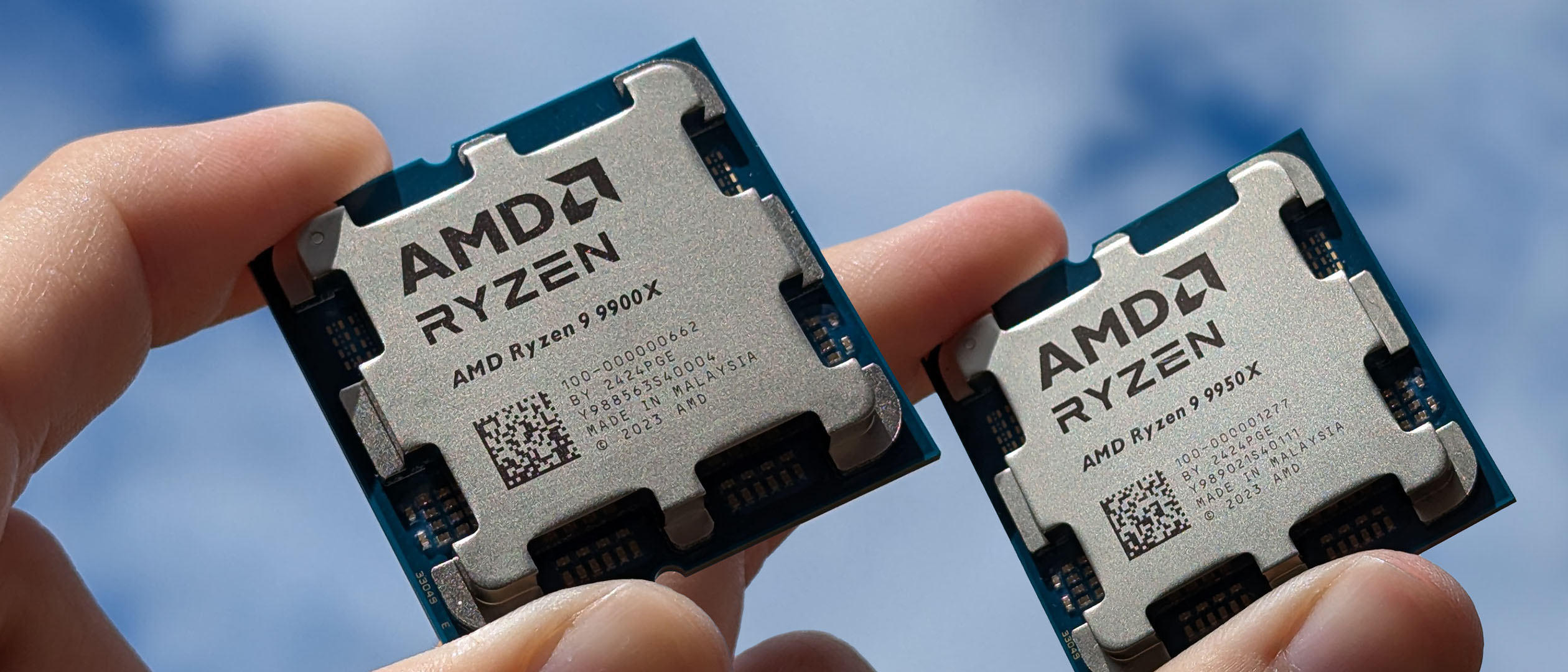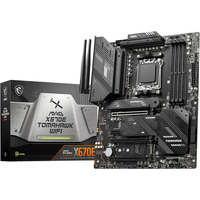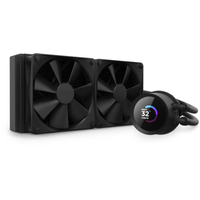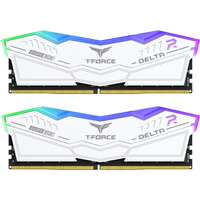Windows Central Verdict
It's indisputable that the Ryzen 9 9950X is the world's most powerful consumer CPU, but it comes at a cost, both literally and through hardware requirements. You'll need a capable cooler to keep this 170W beast under control and performing its best, but it'll deliver the best metrics for creative apps. On the other hand, the 9900X stands up to Intel's 14th Gen Core i9-14900K at a lower cost, but both chips only make sense for those upgrading from much older hardware.
Pros
- +
The 9950X is now the most powerful consumer CPU on the market
- +
Two of the best processor choices for professional creators and hobbyists
- +
9900X competes at a lower cost and TDP than Intel's Core i9-14900K
Cons
- -
9950X is extremely expensive and pulls more base TDP than any rival
- -
Neither is worth an upgrade from Ryzen 7000 or Intel 13th/14th Gen
- -
Future Ryzen 9000-X3D chips will still be more tempting for gamers
Why you can trust Windows Central
After a short delay to the planned release of AMD's all-new Ryzen 9000 Series desktop processors, the ultra-powerful Ryzen 9 9900X and 9950X are ready for an imminent launch.
Following the entry-level Ryzen 5 9600X and mid-range champion Ryzen 7 9700X, these high-end chips increase the critical specifications to target enthusiast gamers and professional creators.
Are the extreme performance goals of the Ryzen 9 9950X worth the considerable asking price, or can you settle for a more affordable Ryzen 9 9900X and still crunch the most complex creative tasks? Here's what I found in my testing.
Disclaimer
This review was made possible by a review sample provided by AMD. The company did not see the contents of the review before publishing. Some extra benchmark results (mainly for Intel Core CPUs) come from public databases and third-party sources, including CPU Monkey.
Ryzen 9 9900X and 9950X: Price, availability, and specs
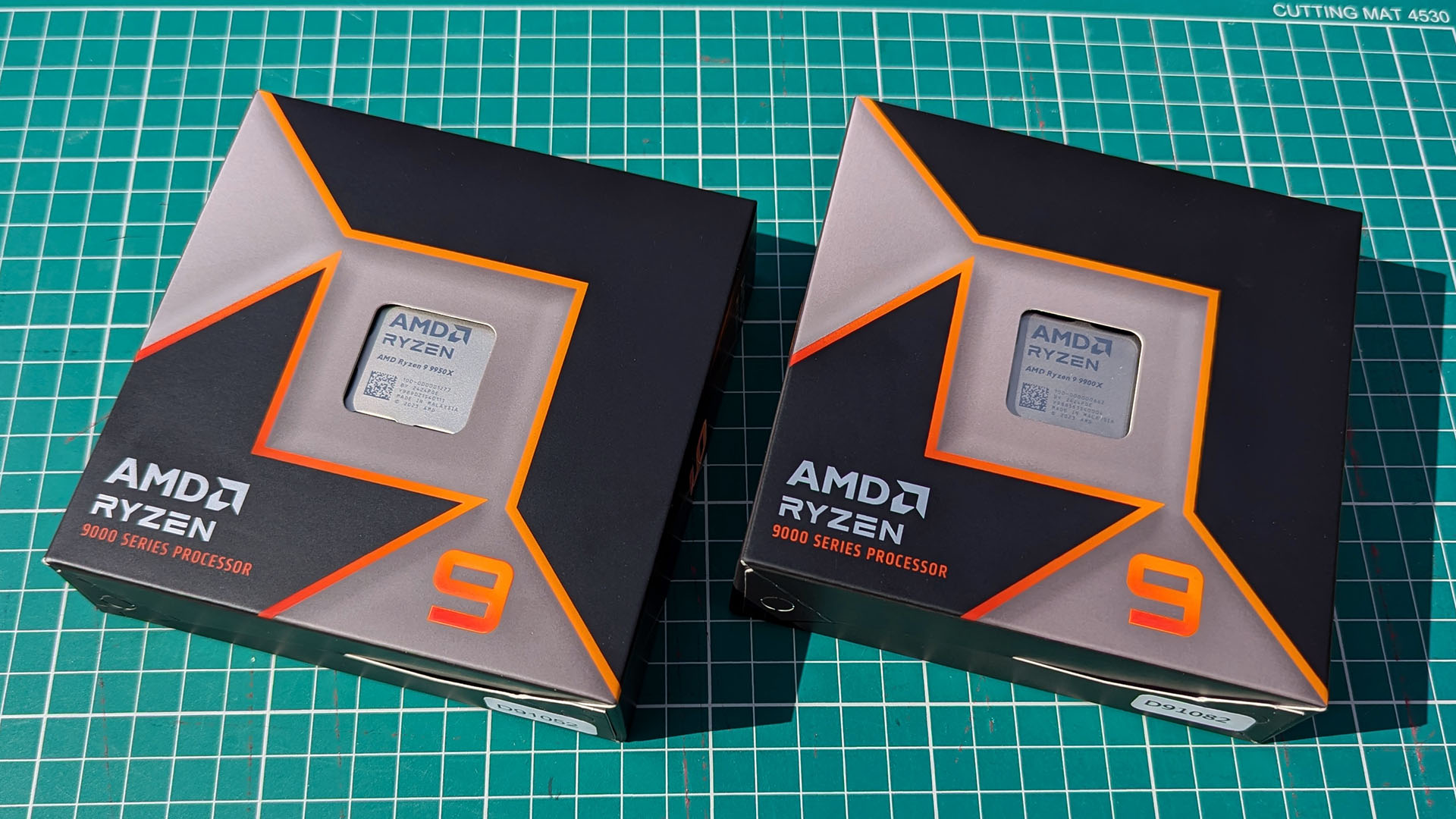
Price: $499 at Newegg
Release: August 15, 2024
Cores/threads: 12c 24t
Base clock: 4.4GHz
Max boost: 5.6GHz
L3 cache: 64MB
TDP: 120W
Price: $649 at Newegg
Release: August 15, 2024
Cores/threads: 16c 32t
Base clock: 4.3GHz
Max boost: 5.7GHz
L3 cache: 64MB
TDP: 170W
AMD will sell the Ryzen 9 9950X through mainstream third-party storefronts, like Best Buy and Newegg, for a $649 MSRP from Thursday, August 15, 2024. It's the lowest price for a Ryzen 9 -950X chip so far, dropping $50 from the previous-gen Ryzen 9 7950X and $150 below the 5950X.
Its second-most powerful 9000 Series chip, the Ryzen 9 9900X, launches simultaneously at the same storefronts for $499 MSRP. That's another $50 drop from the Ryzen 7000 Series equivalent, which matched its price with its 5000 Series predecessor.
While the top-end Ryzen 9 9950X's base TDP hasn't changed, matching the massive 170W pull of the 7900X and 7950X, the Ryzen 9 9900X slims to a more modest 120W. It's not quite the 105W of the high-end 5000 Series chips, but it follows the performance-per-watt targets of the Ryzen 5 9600X and Ryzen 7 9700X.
| CPU | Cores / Threads | Max clock | L3 | Base TDP | MSRP |
|---|---|---|---|---|---|
| AMD Ryzen 9 9950X | 16/32 | 5.7 GHz | 64 MB | 170 W | $649 |
| AMD Ryzen 9 9900X | 12/24 | 5.6 GHz | 64 MB | 120 W | $499 |
| AMD Ryzen 9 7950X | 16/32 | 5.7 GHz | 64 MB | 170 W | $699 |
| AMD Ryzen 9 7900X | 12/24 | 5.6 GHz | 64 MB | 170 W | $549 |
| AMD Ryzen 9 5950X | 16/32 | 4.9 GHz | 64 MB | 105 W | $799 |
| AMD Ryzen 9 5900X | 12/24 | 4.8 GHz | 64 MB | 105 W | $549 |
AMD's Zen 5 Ryzen 9000 chips don't include its XDNA 2 NPU (Neural Processing Unit) for dedicated AI processing, but the CPU chiplet still processes any workloads with an 'enhanced' Advanced Vector Extensions 512 (AVX-512) datapath. Anyone looking for a modern NPU on AMD hardware should explore the Ryzen AI 300 Series mobile chips and Ryzen 8000G desktop chips, like the previously reviewed Ryzen 7 8700G, instead.
A dual-core integrated Radeon graphics chiplet features in the Ryzen 9 9900X and 9950X, each clocked at 2.2GHz, which supports video-out for those without a discrete desktop graphics card. Expansion card support depends on your motherboard choice, though PCIe 5.0 modern GPUs and NVMe solid-state drives alongside mandatory DDR5 RAM are standard. Choosing between the Ryzen 9 9900X and 9950X will depend mostly on your software needs, but AMD has the same component recommendations for both.
Recommended hardware
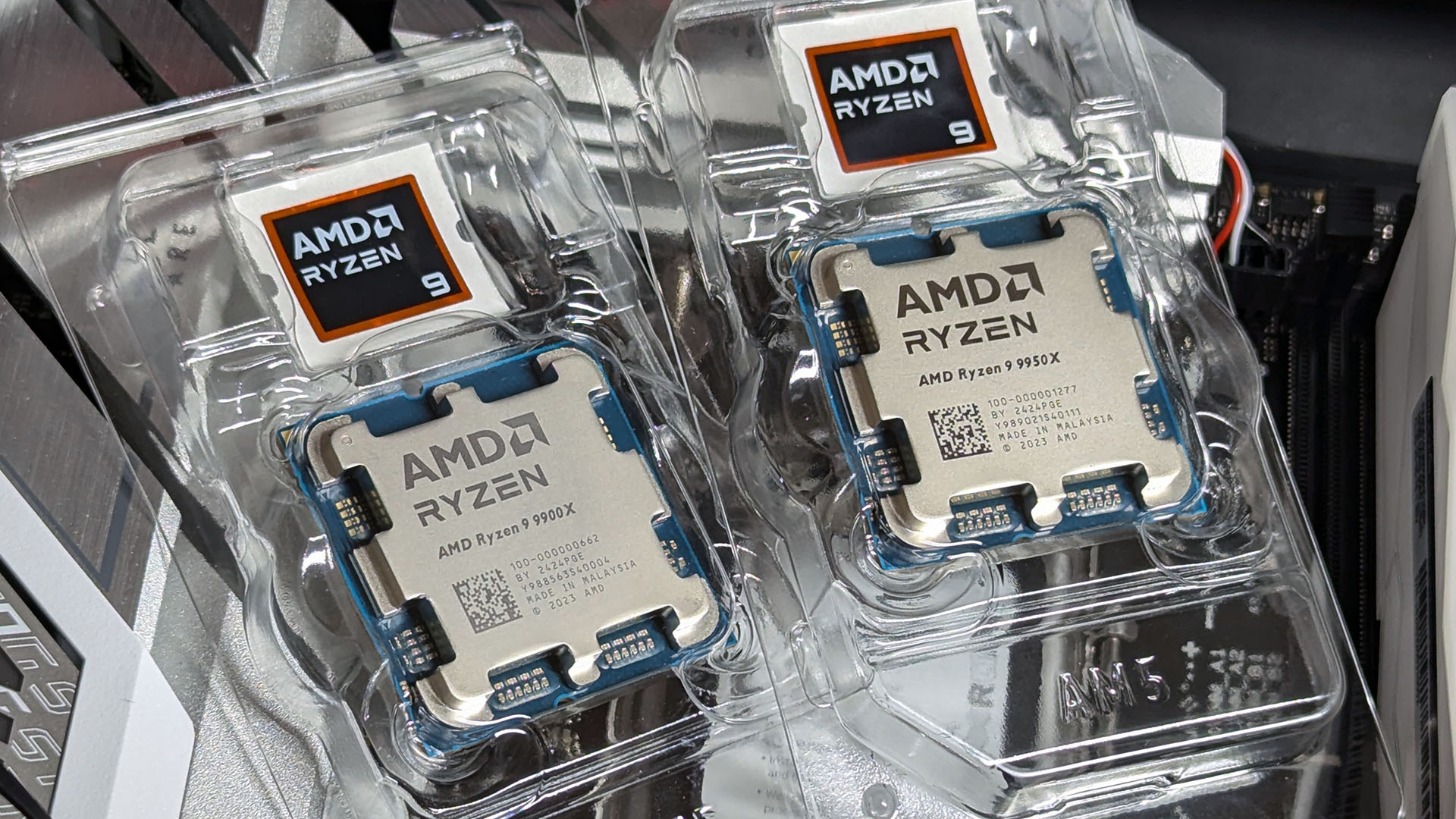
AMD recommends a 240mm or 280mm all-in-one (AIO) liquid cooler for the Ryzen 9 9900X and 9950X with the upcoming 800 Series of AM5 motherboards, including X870 and X870E chipsets. While 870 Series motherboards will be able to push overclocked DDR5 memory speeds to 8000MT/s and beyond, I used a sample of T-Force Delta RGB 32GB DDR5-6000 RAM with the still-encouraged AUTO:1:1 DDR5-6000 EXPO profile to stay in the performance "sweet spot."
MSI MAG X670E Tomahawk Wi-Fi
PCIe Gen 5 support for expansion cards and lightning-fast M.2 solid-state drives alongside onboard Wi-Fi 6E.
Buy: $249 at Amazon | $259.99 at Newegg
NZXT Kraken 240
Available as variants with a 240mm or 280mm radiator, I've used the former for a year now.
T-Force Delta RGB 32GB DDR5-6000
Ready with a DDR-6000 'sweet spot' profile for AMD EXPO, Delta RAM comes in black or white.
Ryzen 9 9900X: Benchmark results
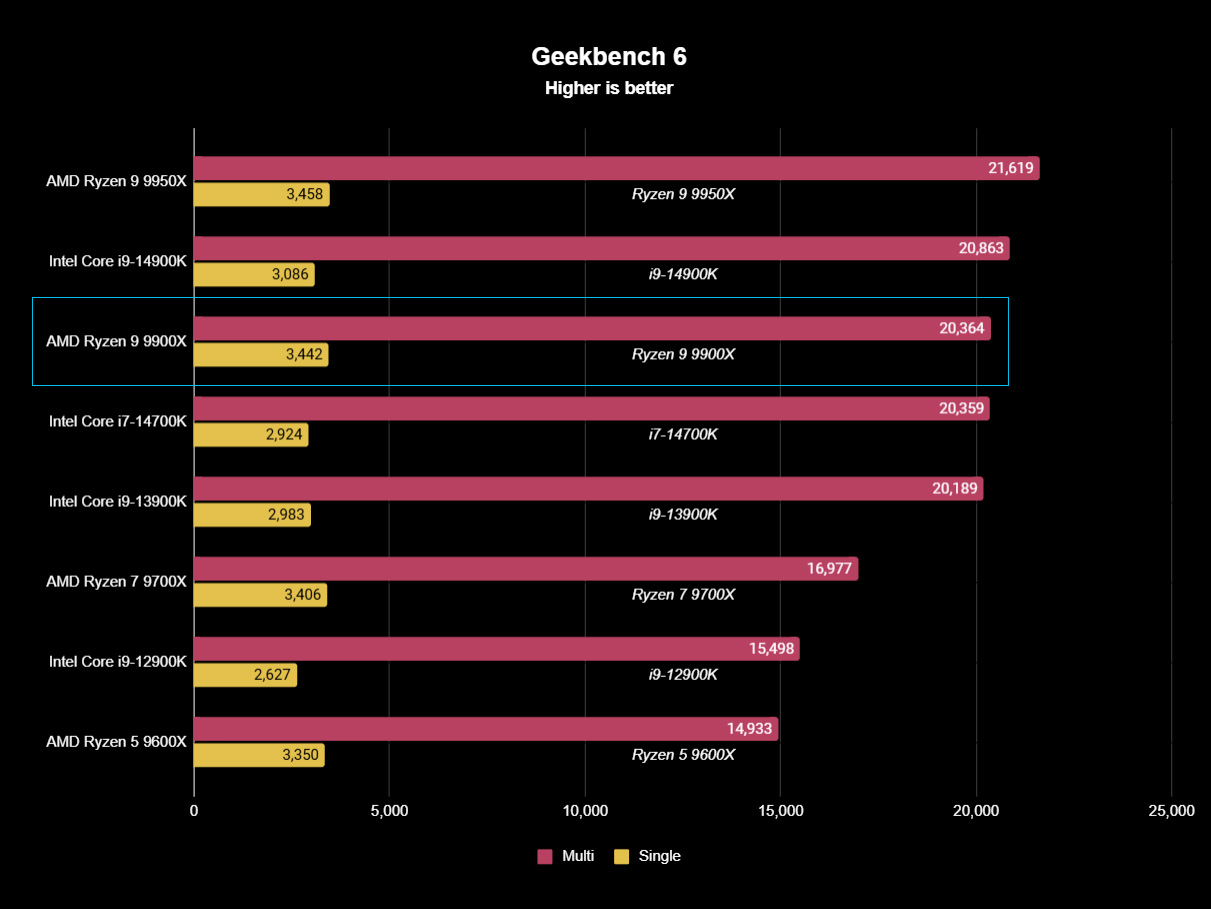
The Ryzen 9 9900X is the third desktop chip in the Zen 5 range to drop its base TDP, moving down from the Ryzen 9 7900X's 170W to 120W. It follows the Ryzen 5 9600X and Ryzen 7 9700X, each dropping from 105W to 65W while maintaining a generational performance improvement. The focus on performance-per-watt means that the multi-core leap wasn't as significant for this generation, but a massive boost in single-core performance stands out, again, on the Ryzen 9 9900X.
The 9900X falls behind (Intel's Core i9-14700K) in multi-core performance but fires miles ahead in single-core equivalents.
Officially, AMD pitches the Ryzen 9 9900X as a direct rival to Intel's 14th Gen Core i9-14900K, a 125W chip with a higher 24/32 core/thread count and $589 MSRP. Since release, the 14900K has dropped to around $546, which doesn't help its chances of temptations alongside the recent degradation controversy I'll get into later. However, the 9900X falls behind in multi-core burst performance with Geekbench 6 benchmark tests but fires miles ahead in single-core equivalents, second only to the Ryzen 9 9950X.
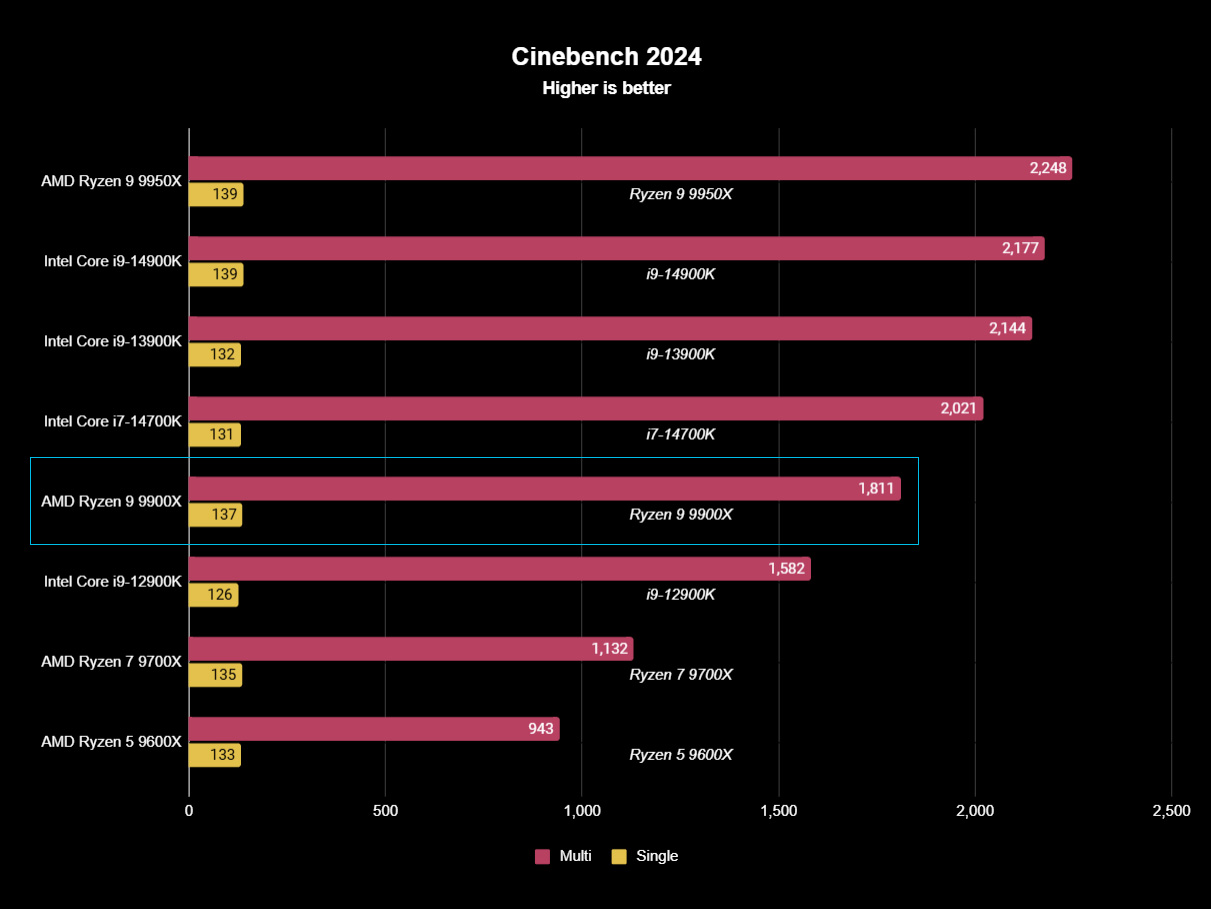
Intel creeps ahead in sustained stress tests with Cinebench 2024 with its 14th Gen Core i7-14700K and two Core i9 chips, one from the previous 13th Gen. Only here does AMD drop slightly behind the top Core i9-14900K in single-core performance. The wattage difference is slimmer than for the 65W Ryzen 5 9600X and Ryzen 7 9700X chips against the 125W Core i5-14600K, but accolades should be awarded for AMD's efficient single-core efforts.
It's a similar story across all the 9000 Series: if your software suite benefits from single-core performance, the 9900X is for you. Its 120W base TDP is a considerable decrease from its power-hungry sibling, the top-end Ryzen 9 9950X, but it's impossible to deny the performance gap between the two. The good news is that the gap has a difference of $150, so you're not being sold an impossible dream, just that AMD made a set of cuts to market the 9900X to those in a specific budget range.
Is the AMD Ryzen 9 9900X good for creators?
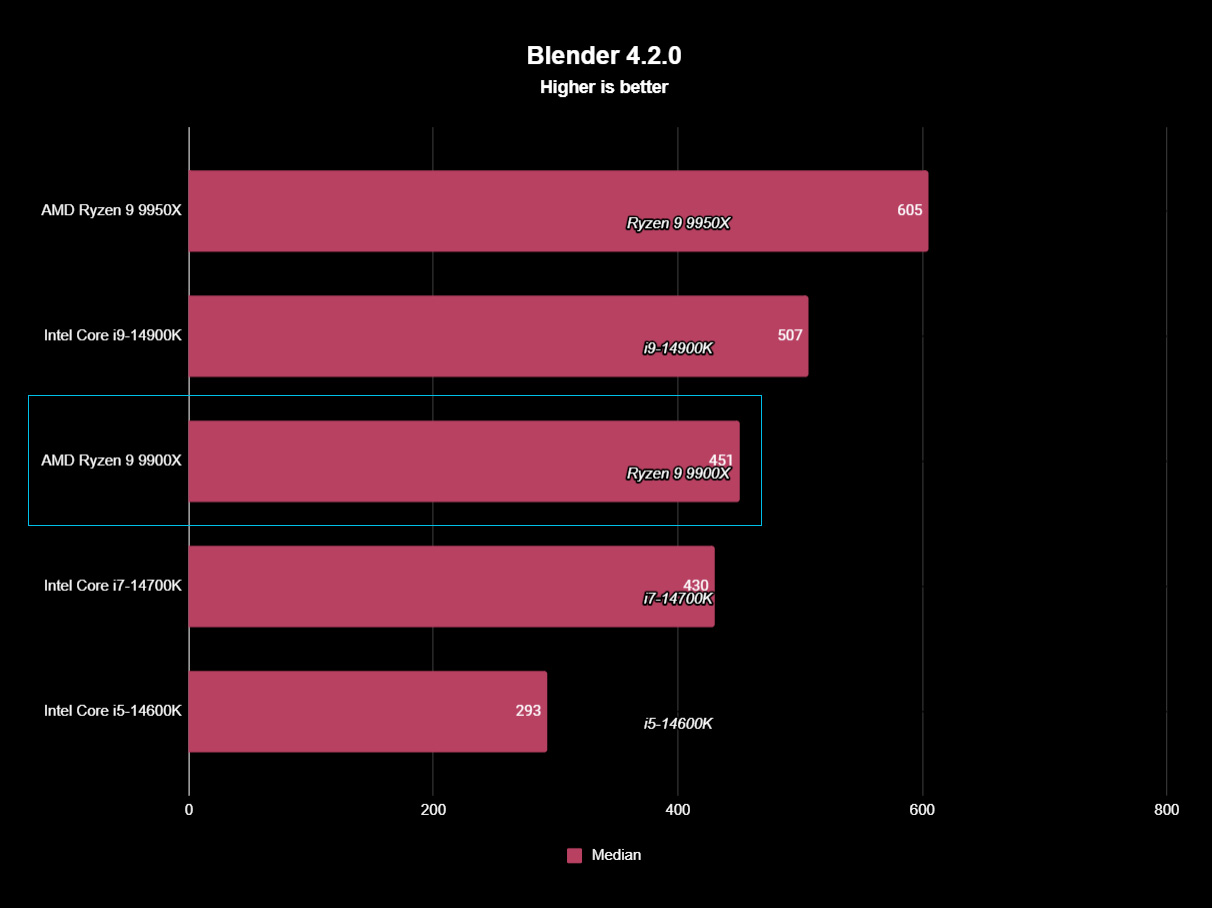
Comparing CPU-centric median benchmark results for Blender (4.2.0) places the Ryzen 9 9900X between its more powerful Ryzen 9 9950X counterpart and Intel's Core i9-14900K, though it's closer to the Core i7-14700K overall. It matches the average placement of the results from my usual benchmark, showing that AMD can fight against Intel's best with slightly less power and a much lower asking price.
If you work with 3D rendering software like Blender or anything with a similar CPU load, you should be thrilled with this more affordable, almost top-end desktop offering. Intel's Core i7-14700K is available for around $419 these days, which is slightly cheaper than the Ryzen 9 9900X, but performs slightly below the same chip in multi-core tests and much further below in single-core tests.
Ryzen 9 9950X: Benchmark results
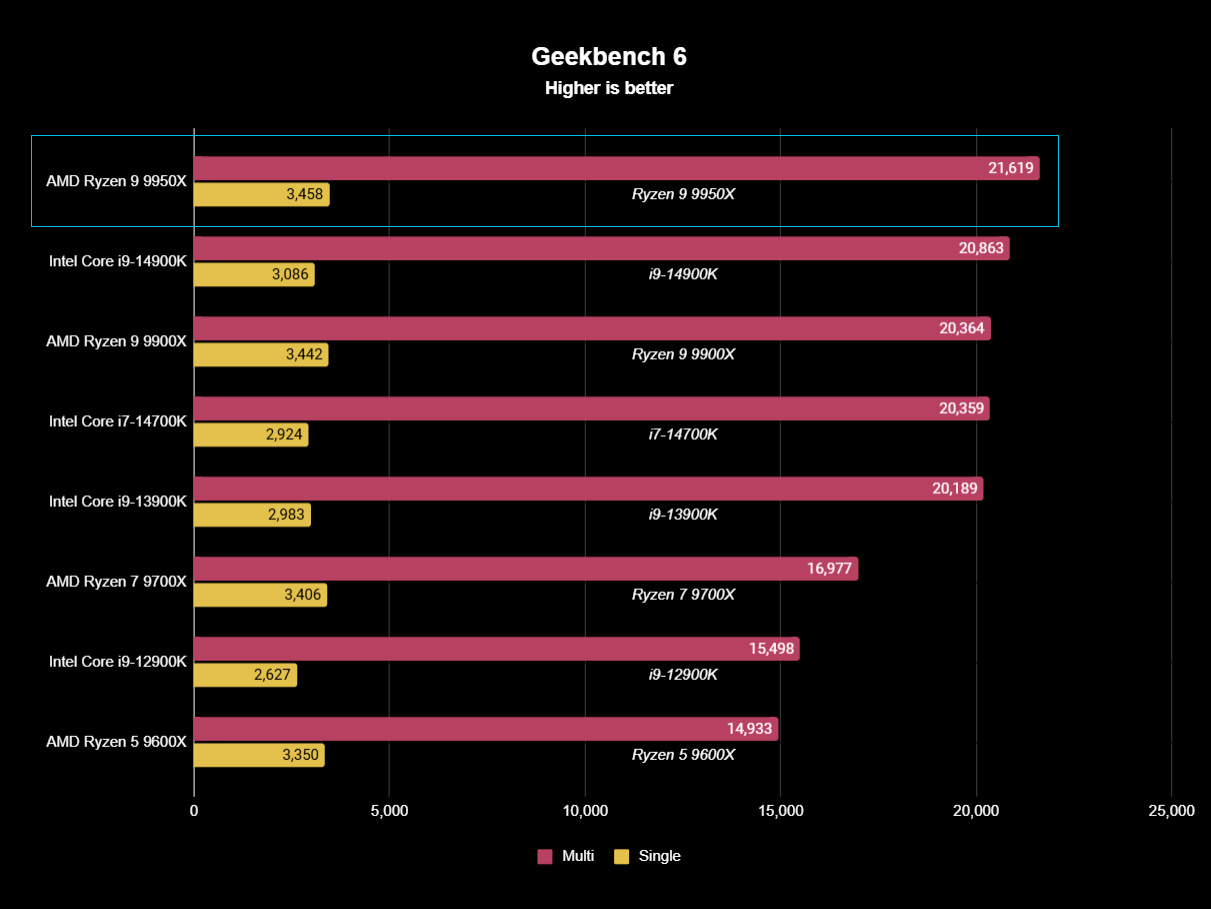
AMD's new top-end consumer processor is more expensive than its Intel rival, and there isn't much to say about the Ryzen 9 9950X besides that it's the most powerful desktop CPU in the world, at least before you resort to workstation-grade Threadripper chips. A $649 MSRP will sting but allows the best single-core and multi-core benchmarking test scores I've seen to date. It's a beast, topping the charts and doing everything it claims to, albeit reliant on some demanding system requirements.
There isn't much to say about the 9950X besides that it's the most powerful desktop CPU in the world. It's a beast.
The most important specification of the Ryzen 9 9950X to remember is its massive 170W base TDP. That's significantly higher than Intel's 125W Core i9-14900K and only matched by previous-gen desktop chips from AMD. The 9950X sticks to a 16-core setup with 32 threads rather than the 24-core, 32-threads of Intel's 14900K, dividing that power to fewer physical cores while offering more shared L3 cache at 64MB over Intel's 36MB of Smart Cache. It's a more powerful chip, but that power doesn't come out of thin air.
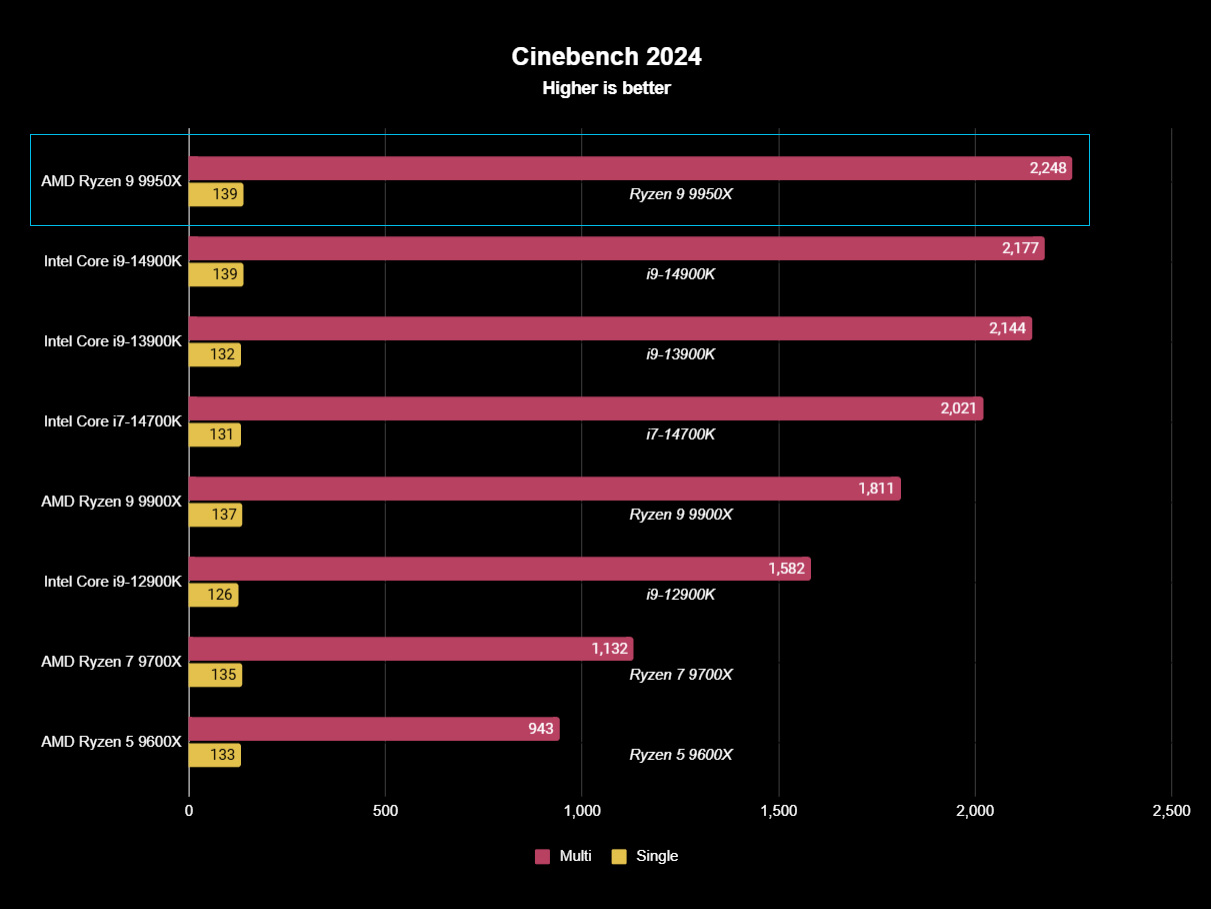
AMD's Ryzen 9 9900X scores are at the top of my usual burst and sustained stress testing. As pointed out in the Ryzen 9 9900X section of my review, it even soars past Intel's 14th Gen Core i9-14900K in creative 3D apps like Blender, meaning there isn't anything more powerful to choose until you graduate to workstation machines with AMD's Ryzen Threadripper chips. Intel at least scores level in single-core performance results with the Cinebench 2024 benchmark, but the 9950X moves ahead with its multi-core score.
Again, this processor pulls significant power from the socket and requires a capable liquid cooler to prevent throttling due to overheating. However, anyone seriously considering the absolute top-end parts likely isn't worried about the penny-pinching habits of ultra-budgeting and will pair a suitable set of components with the Ryzen 9 9950X to maximize its potential. AMD has delivered the ultimate performance CPU for any manner of creative work and enthusiast-grade gaming, including complex livestreaming.
Ryzen 9 9900X and 9950X: The competition
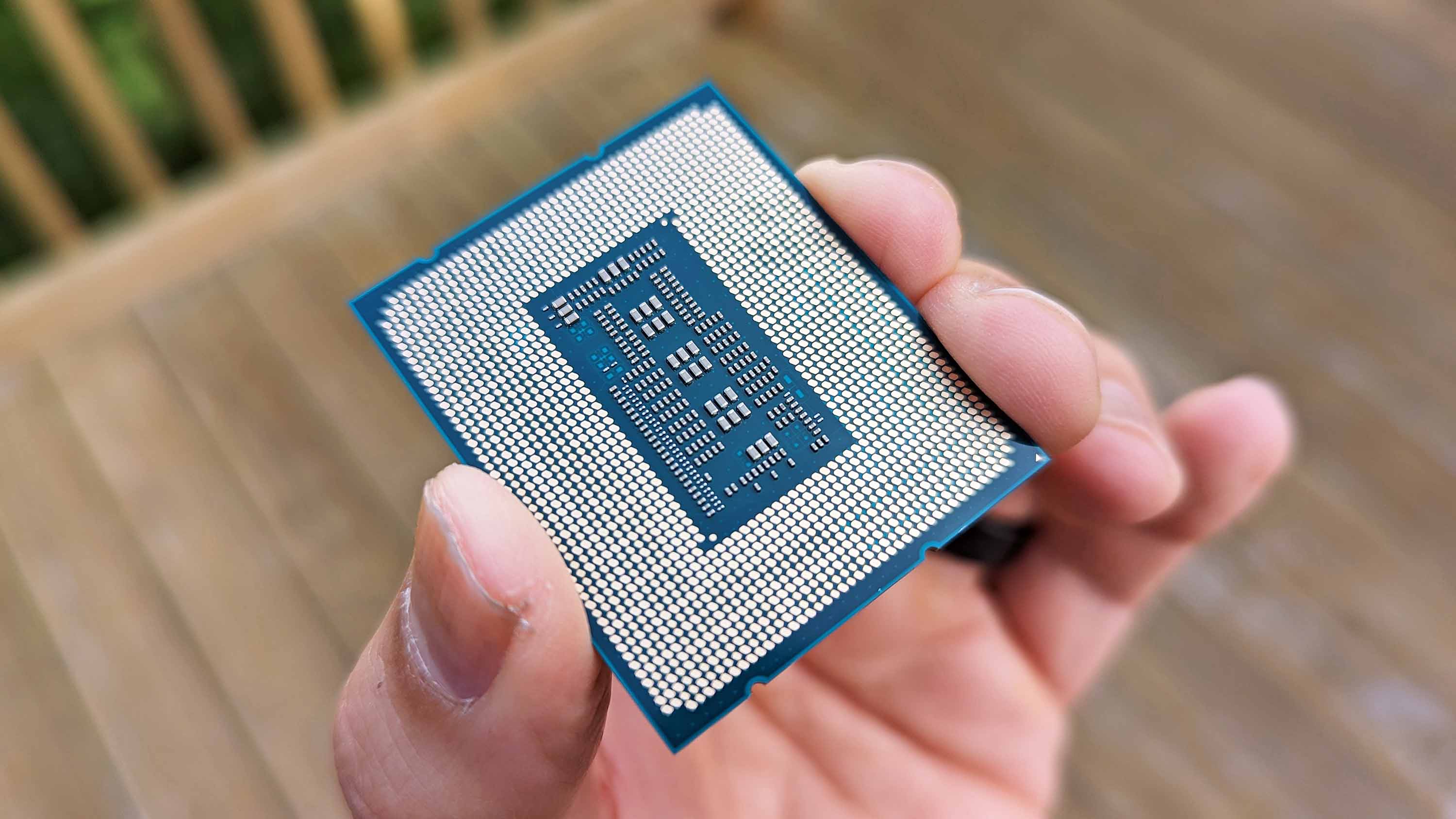
Making comparisons is tricky when you're at the top, and AMD only has one chip at Intel to compete with: the 14th Gen Core i9-14900K. That goes for the Ryzen 9 9900X and the 9950X, both of which beat (or match) the i9-14900K in single-core performance. It's a bit of a moot point for the top-end 9950X for everything except the $649 asking price since the 14900K has dropped as low as $546 since launch, while the 9900X starts even cheaper at its $499 MSRP.
Again, a discussion around base TDP is only relevant for the Ryzen 9 9900X running at 120W, which is an almost negligible 5W below the 14900K. The 9950X sticks to AMD's monstrous 170W category for its high-end -X Series chips, far higher than Intel's top-end. If you're comfortable running a power-hungry processor and can keep the 9950X cool enough with a capable AIO liquid solution, it'll offer the best performance on the market but charge a $100 premium for the benefit.
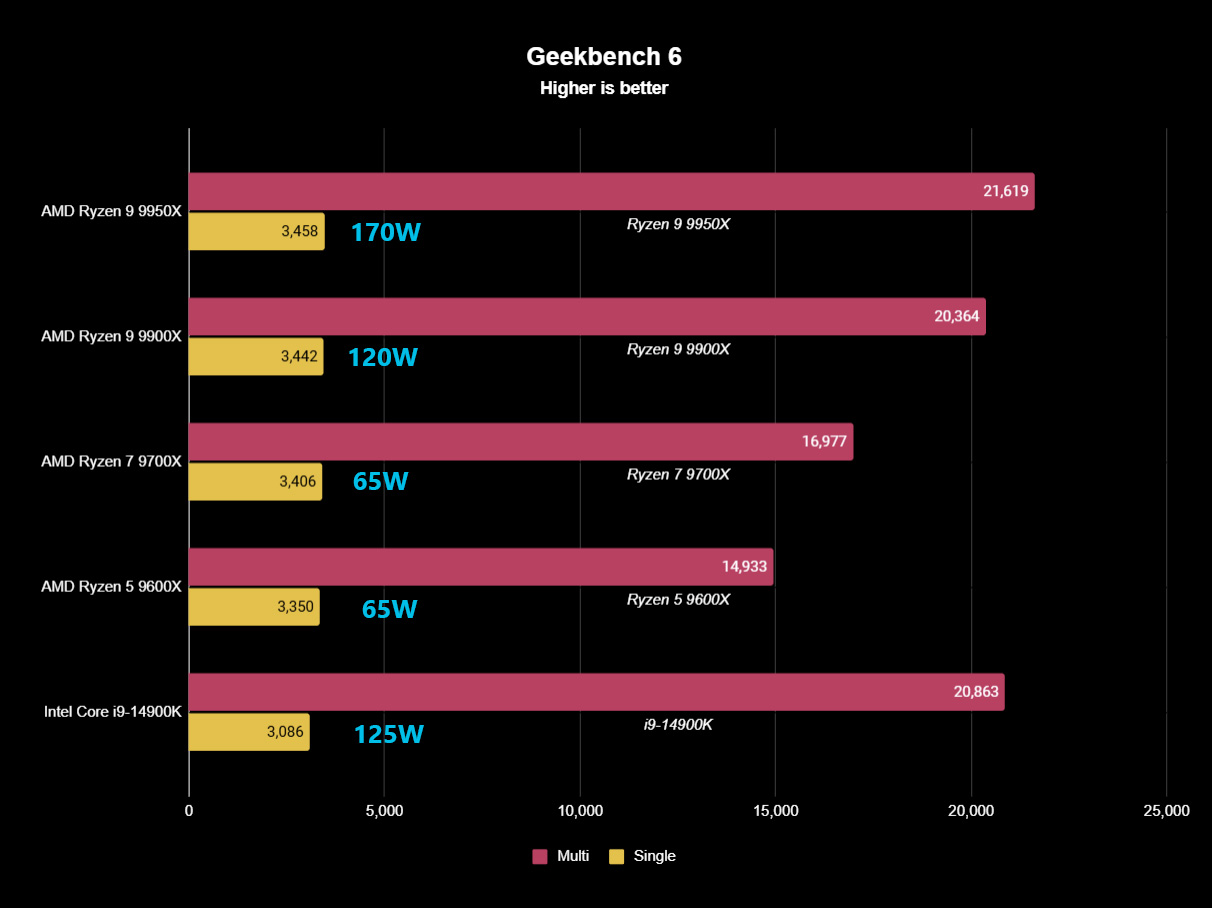
For performance-per-dollar, the Ryzen 9 9900X still beats Intel's Core i9-14900K despite its post-launch price drop, and that could remain the case if AMD reduces the listings in a matching cadence over the coming months. So, even if the playing field were even, AMD would still have the edge on value with the 9900X, at least for the first few months of its availability.
If you absolutely must have the best performance, the Ryzen 9 9950X will deliver.
However, I can't ignore the instability crisis Intel is suffering with its 13th and 14th Gen Core desktop chips. A microcode (firmware) patch has already started rolling out to compatible motherboards, which should, in theory, prevent any overvoltage damage to the affected chips, like the i9-14900K. This slight reduction in performance profile metrics reportedly doesn't seem to make a noticeable difference in real-world usage, either (via AnandTech).
Still, the Ryzen 9 9900X and 9950X top the charts for single-core performance and offer a split set of specs with a huge difference in cost. If you absolutely must have the best performance, the 9950X will deliver, but you'll need to pair it with a capable cooler to prevent throttling. On the other hand, the 9900X offers a solid challenge for Intel's top-end Core i9-14900K for a slightly lower asking price and base TDP if you're ready to adopt AM5 motherboards.
Ryzen 9 9900X and 9950X: Should you buy?
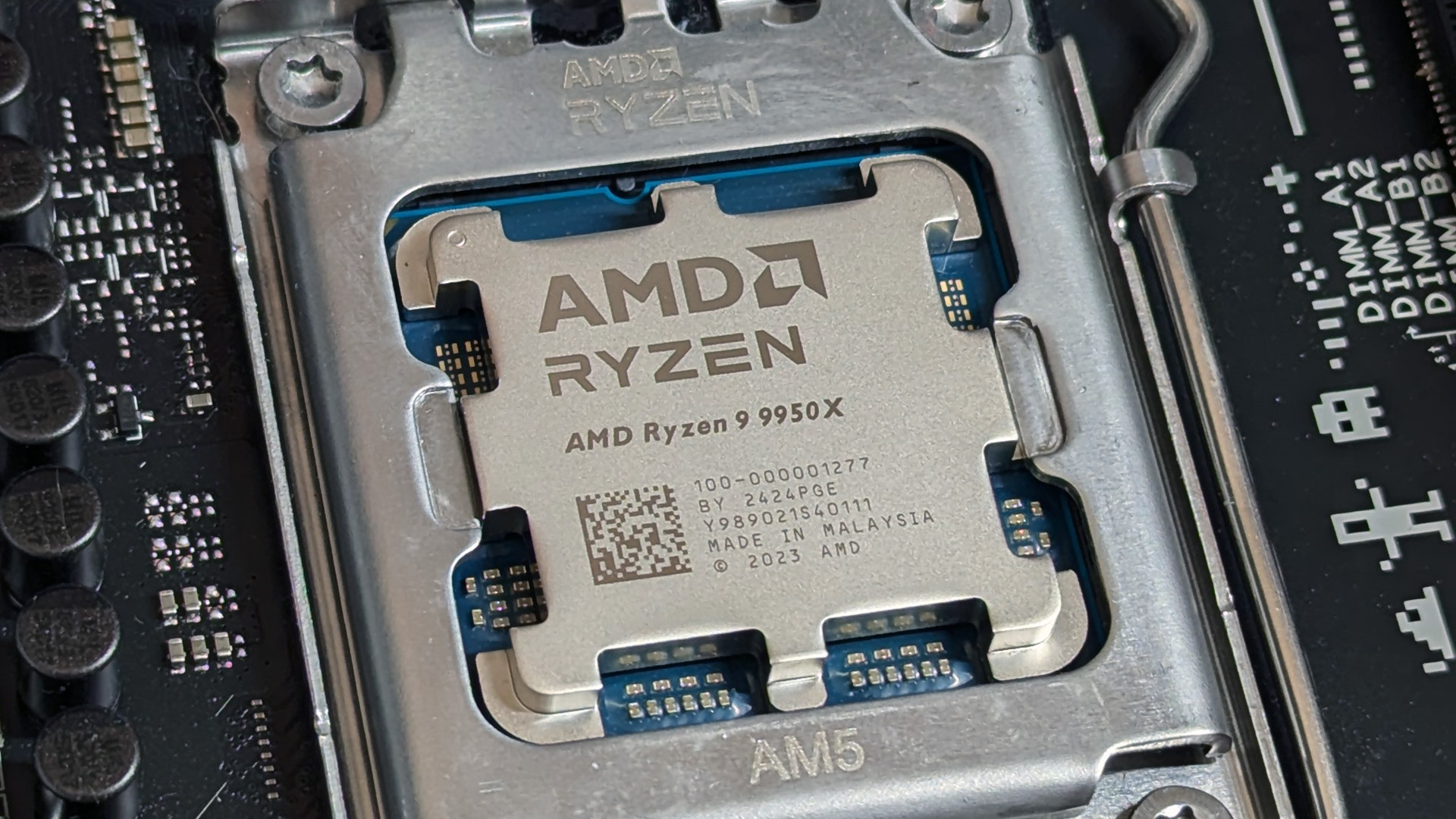
You should buy this if ...
✅ You want the best consumer desktop CPU
If you want the ultimate performance for creative software and complex livestreaming, the Ryzen 9 9950X is the king of the hill in all metrics.
✅ You need a powerful processor for creative apps
The Ryzen 9 9900X offers a more sensible option for those working with real-time and pre-rendered content, matching or closely comparable to Intel's Core i9-14900K.
You should avoid this if ...
❌ You already use a Ryzen 9 7900X or 7950X
The multi-core generational leap is so minor from the 7000 Series to the 9000 Series that you won't see any significant differences to warrant the cost.
❌ You already use an Intel 13th or 14th Gen Core i9
Choosing the 9900X over an i9-13900K or the 9950X over an i9-14900K makes sense if you're upgrading from older hardware, but overhauling your modern motherboard to switch to AMD isn't worth it.
Much like the entry-level Ryzen 5 9600X and mid-range Ryzen 7 9700X, this pairing of high-end Ryzen 9 desktop chips makes more sense to those upgrading from AMD's Ryzen 5000 Series or Intel's 12th Gen and older. For this crowd, there's no denying the 9950X's dominant grip on the consumer CPU market, even if it comes with a considerable price tag. Meanwhile, the 9900X aggressively targets Intel's top-end 14th Gen Core i9-14900K and heartily competes at a lower cost, though it fell behind at times.
They're excessive and powerful, needing capable CPU coolers to prevent throttling from overheating, especially with the 170W powerhouse 9950X, but both Ryzen 9 chips deliver what AMD promises: high-end performance for creators. I'd still recommend that hardcore PC gamers hold on for the inevitable Ryzen 9000 -X3D chips, but those heavily into content creation will appreciate the standard -X Series if it fits into their budget.
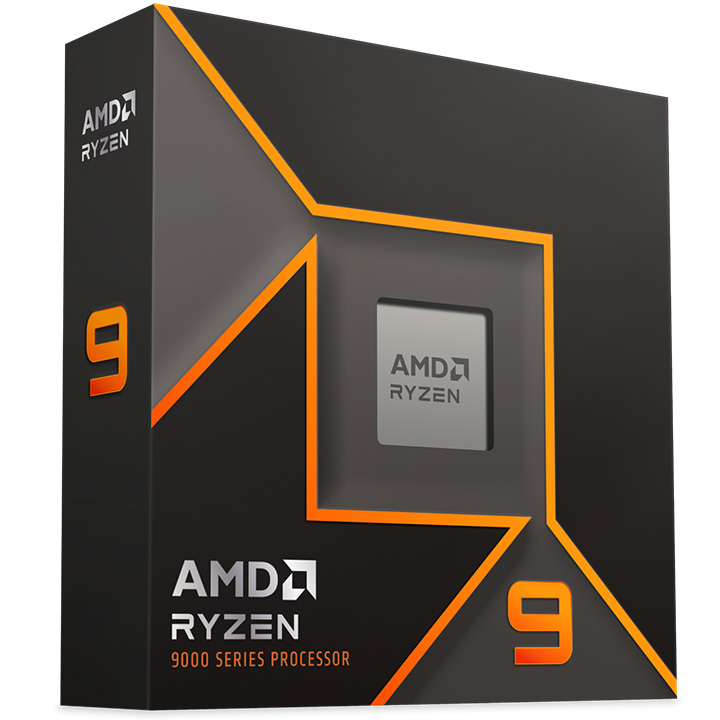
For gamers with a passion for livestreaming, it offers almost max specs for a reasonable price and power draw.

Ben is a Senior Editor at Windows Central, covering everything related to technology hardware and software. He regularly goes hands-on with the latest Windows laptops, components inside custom gaming desktops, and any accessory compatible with PC and Xbox. His lifelong obsession with dismantling gadgets to see how they work led him to pursue a career in tech-centric journalism after a decade of experience in electronics retail and tech support.
